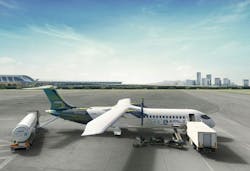Airbus teams with Kansai Airports and Kawasaki to study hydrogen aviation potential in Japan
TOKYO - Airbus in Toulouse, France, Kansai Airports in Kansai, Japan, and Kawasaki Heavy Industries in Tokyo signed an agreement to explore hydrogen infrastructure feasibility at Kansai International Airport, Osaka International Airport, and Kobe Airport. The memorandum outlines a study to assess the introduction and operation of hydrogen-powered aircraft as part of the "Hydrogen Hub at Airports" program.
The collaboration will focus on defining a roadmap for hydrogen infrastructure and supply needs at each airport, taking into account specific operational requirements. The study will assess technology, economic factors, regulatory compatibility, and operational impact, with demonstration projects and policy recommendations expected as next steps.
Since 2022, Airbus and Kansai Airports have been working to integrate hydrogen into airport infrastructure, with Kansai Airports already operating hydrogen-powered buses and forklifts. Airbus also partnered with Kawasaki, which has developed end-to-end hydrogen supply systems, including options for cryogenic hydrogen networks.
Related: Airbus UpNext and Toshiba to collaborate on tech for hydrogen-powered aircraft
The partnership builds on earlier studies that examined hydrogen infrastructure feasibility and moves into a second phase focused on practical applications. Airbus has projected that the demand for liquid hydrogen at these airports could start with several tons per day, potentially reaching hundreds of tons by 2050.
"Hydrogen is attracting global attention as a way to decarbonize. The Japanese Government is promoting a hydrogen-based energy strategy to achieve its carbon neutrality target by 2050," said Karine Guenan, Head of ZEROe Ecosystem. "In fact, the Japanese Government has announced specific plans for the development of hydrogen from production to consumption. We believe our partnership with Japanese companies under the Hydrogen Hubs at Airports program will contribute to the introduction of a hydrogen-powered aircraft by 2035."
Kawasaki’s Executive Officer Motohiko Nishimura added, "We believe that this three-company partnership will be a step towards a solution for decarbonization through the use of hydrogen in the aviation industry, where a reduction in CO2 emissions has been deemed difficult. The signing of this memorandum of agreement is sure to accelerate Kawasaki’s efforts to achieve a hydrogen-powered aircraft."
